I’m always happy when mezcal gets the limelight treatment. Gone, hopefully, are the days when the trend in major media was to talk about it as “tequila’s smoky cousin” or a labored description of it as something other than the bottle with the worm in it. Sadly mezcal had become a cliche and a clear example of how branding functions. It had been branded as cheap alcohol that got you really drunk and was steeped in all sorts of misconceptions that some brands were using to sell lots of product. Many kids, myself included, visited Mexico and dined out on stories of eating the worm but we all know those years are past, right?
Sadly, it’s mostly us, this little club of mezcal aficionados who know that so many of those stereotypes were long eclipsed by a refined spirit that always existed: It’s just that the rest of the world is waking up to it. So, yes, I’m always happy to see when someone in the mainstream media gives mezcal the trend treatment. It means that mezcal is important enough to pay attention to and that’s a great thing for the entire category.
But something funny happens in trend articles – they want to be about the trend and not necessarily about the thing itself. I’ve been there plenty of times. Anyone who has written anything knows that it’s achingly difficult to portray something correctly and errors are inevitable even if you have an army of fact checkers because they will never have been there and seen how things are done. Fortunately, most of the time the errors aren’t major and no one is hurt. It’s just painful when the people really in touch with the subject area notice.
With that in mind I urge you read Bon Appetit’s recent article on mezcal. It has everything that you could want – mezcal is presented as cool, something to be savored, something to be respected, it’s even presented as a healthy spirit! These are all great and laudable aspects. There’s just one niggling problem in the following sentence and the entire gloss that this article gives to Yola Mezcal:
From its start, the brand has employed only women, from the farmers to the bottlers, because of a theory Jimenez learned in college: When you pay the women of the family, more money stays within the household.
As I said, writing is a complex endeavor so errors can be introduced at any point in the process so I’m not throwing shade, I just want to point out that this is an error and muse a bit on how it fits into a pattern.
First, it is almost impossible to solely employ women in creating mezcal. Gender has nothing to do with it, culture and production everything. Most of the small distilling operations are family run which means that everyone in the family has a hand in them. Even the larger operations tend to employ extended families. I’d love to hear about a single gender mezcal operation exactly because it would be so odd (If you know of one, email me!).
I checked Yola’s self description for comparison. Here’s their marketing description:
YOLA Mezcal has reached perfect balance between authenticity and aesthetics. Created in collaboration between Yola Jiminez (of La Clandestina Mezcaleria fame), Lykke Li (Swedish songwriting sensation), and Gina Correll Aglietti (chef and stylist), YOLA counters the patriarchal system which is so ubiquitous in the Oaxaca. YOLA is run by women and bottled by women. We’ve seen time and again that no palenque succeeds without the aid of a strong women, and YOLA provides a place where the women of Oaxaca can have steady work. In addition, they happen to be making absolutely delicious mezcal that will satisfy even the most hardcore purist, but entice any novice to take another sip…
When you parse that finely you can see that Yola never claims that it is made only by women, just that it’s run by and bottled by women. So, they’ve threaded that needle fairly enough and emphasize that women are important to mezcal production which is also an incredibly important point. This contrast in descriptions shouldn’t reflect negatively on Yola nor Bon Appetit because I’m pretty sure that there was some simple miscommunication about this one little sentence. But it creates a great opportunity to dive into a bigger set of issues that we need to get into.
Women have always been in mezcal
As Susan wrote recently about a panel at the San Antonio Cocktail Conference, women are and have always been integral to mezcal and everything else in rural Mexico, they just haven’t necessarily been recognized for that work. Women like Graciela Angeles are properly feted because they’re relatively rare as media forward figures who make mezcal. But ask them and they’ll immediately tell you that women have done everything in the mezcal world. They help raise the agaves, they help in the palenque, with the bottling, with the sales, you name it. It’s always been that way. It still is. Yola points this out and that’s fantastic. More of that please!
We want mezcal to look like us
There are enough types of mezcals, mezcal producers, and stories about mezcal to fill volumes. You could probably make stories up and they would be true exactly because the world of mezcal is vast, old, and full of legions. A big part of the joy of mezcal is learning the stories around it, especially when you can go and experience them yourselves by meeting producers, understanding production, seeing the fields, and sharing in everything, the natural beauty, the social and cultural worlds around it. That’s what makes mezcal sing.
But that’s not enough, now that it has some financial and cultural value, mezcal suddenly needs to be marketed which means it needs a narrative, and those narratives have to connect to us, the consumers thousands of miles and a culture away from where the mezcal is made, regardless of whether they have any connection to the product itself or where it originated.
You know the story, just stroll through Whole Foods to learn the origin stories of a million products. They all feature pure ingredients that don’t harm the world. By using these products, you’re actually helping to save the planet while making yourself healthier and more virtuous. This is one of, if not the, major story we like to tell ourselves. And we have an entire apparatus set up to build stories around them, just look up the website for anything you like to eat or drink. They’re all telling similar variations of the same story, you can probably make them into a Mad Libs game about authenticity!
But, when it comes to mezcal the real story is so true that it hurts. Why can’t we just stick to the basics and tell that story instead of regurgitating a version that is more palpable because it aligns with all our political and social values? The truth is complex, so let’s get comfortable with that complexity, let’s embrace it and make it a key part of mezcal. It’s what makes the spirit different from all the others, so let’s figure out a way to keep it that way!
Origins are important
Because the key thing about mezcal is that it’s made by real people firmly grounded in a very distinct culture and a tradition. That’s not to say that they’re doing things the same way their ancestors were hundreds of years ago, the spectrum of mezcal makers is enormous, but pretty much all mezcal makers are doing something connected to a local culture with its own story. The most important thing is to acknowledge where mezcal comes from, who makes it, and how. And it’s imperative that we get to know those stories.
In many cases this information is front and center. The classic list label dives deep and puts it all in plain type (sometimes even handwritten!) in a more generic form so that all the focus is on what’s in the bottle and the details of the who, what, when, where of the bottle’s production. Take a look at these labels to get a sense of just how important that is:
In theory the mezcal world requires this by requiring a NOM number on a bottle. The number is supposed to correspond to the distillery so that you can look up all the details of manufacture. If more than one label was made at a distillery that information will pop up and, ideally, you can look up all those who, what, when, where details. In reality over the years the idea of the NOM has been minimized to tell us more where something was bottled and now with the latest NORMA has been seemingly neutered.
That’s an issue because we no longer are told who made a mezcal nor how they did it. This is a big issue for the mezcal world – maybe it is the issue of the moment – because you can make all the claims you want about a bottle but if those claims aren’t connected to what’s actually in the bottle, then we’re really only left with a marketing idea of a bottle.
Who makes it?
Using Yola as a test case I dropped by a store to check out the NOM on the bottle but you can’t find that information nor who makes it and very little else about it, just that it’s made in Oaxaca as part of the DO according to a recipe from Luis Jimenez.
I managed to find an older bottle of Yola which has the NOM O36X which, if you check it in our incomplete but fast evolving Mezcal Database, is shared with Benesin. We chatted with Efrain Nolasco who produces Benesin and he confirmed that, in the past, he made mezcal for Yola. We have talked to other producers who tell us that they are now producing for Yola. But we can’t check that information any longer because the NOM isn’t on the bottle. That’s a clear disservice to consumers and says quite a bit about where we are right this second. Wouldn’t it be great if we could simply know who made something this important? And can we at least agree on that so that we can get the narrative back to where it should be, on the people who make it and how they accomplish that amazing feat?


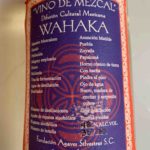
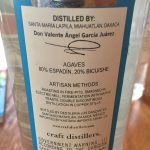

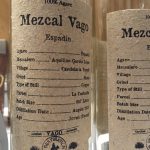
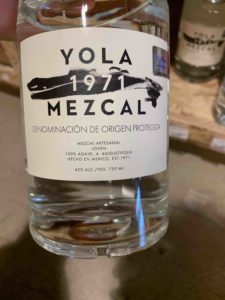
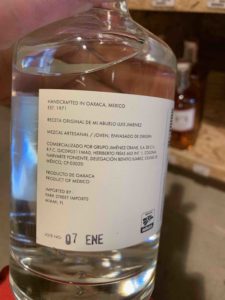
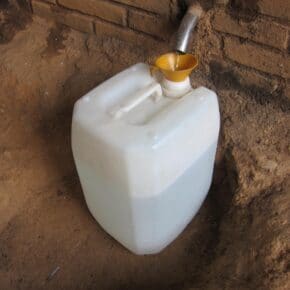
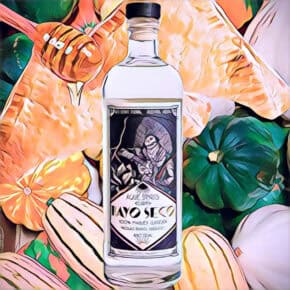

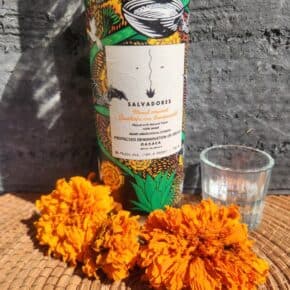







NOM…ugh. The NOM number is a sad situation for both tequila & mezcal. While is should tell us who the producer is, it only tells us who is responsible for the product meeting the standards of production. Since it would be cumbersome to give every mezcal producer their own NOM number, it now only refers to the bottler. Ever see a NOM F____D? That is a mezcal that was bottled outside of the DO, or at the very least, bottled outside of the state from which it was produced.